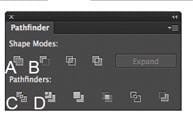9A0-351 Online Practice Questions and Answers
How would you navigate between multiple artboards using the Artboards panel?
A. Click the Artboard Options icon.
B. Click the arrows at the bottom of the panel.
C. Double-click the name of the artboard.
D. Double-click the number of the artboard.
After exporting an Illustrator file to PDF, you notice that some transparent objects were flattened. What are two reasons objects would have been flattened? (Choose two)
A. The document was saved with Compatibility set to Acrobat 4 (PDF 1.3).
B. The Illustrator file contained PSD files with transparent areas.
C. The PDF document was created by using File > Export instead of File > Save As.
D. The PDF document was saved with Standard set to PDF/X-4:2008.
E. The Illustrator file contained Illustrator artwork placed as EPS files.
How should you replace an existing global swatch with another swatch?
A. Delete the existing swatch, then rename the new swatch to match the deleted swatch.
B. Open the Swatch Options dialog box and change the new swatch name to match the existing swatch.
C. Command+drag (OS X) or Ctrl+drag (Windows) the new swatch over the existing swatch.
D. Option+drag (OS X) or Alt+drag (Windows) the new swatch over the existing swatch.
You are working on a document that contains objects on multiple layers. You want to edit several objects on a specific layer while still seeing artwork on other layers, but without the chance of accidentally modifying artwork on those other layers. What is the best way to do this?
A. Select the layer you want to edit and choose Enter Isolation Mode from the Layers panel menu.
B. Double click an object located on the layer that you want to edit.
C. Ctrl+Shift+click (Windows) or Option+Shift+dick (OS X) the lock icon next to the layer you want to edit.
D. Click the target icon on the layer that you want to edit.
You have created a symbol and have added several instances of it to the artboard. You want to make an edit to the symbol and update all instances of the symbol. What are two ways this be achieved? (Choose two).
A. Double-click on the symbol instance with one of the symbolism tools.
B. Double-click on the symbol instance with the Direct Selection tool.
C. Select an instance of the symbol, choose Object > Expand, and edit the symbol.
D. Double-click on the symbol instance with the Selection tool.
E. Right-click on a symbol instance and choose Isolate Selected Group.
You want to vary the width of one side of a stroke, in one area of a path, using the Width tool. How can you achieve this result?
A. Choose an option from the Variable Width Profile menu in the Control panel, then click and drag to the side of the path that you want to modify.
B. In the Stroke panel, change the alignment of the stroke on the path in the direction that you want the stroke modified.
C. Using the Width tool, click and drag to the side of the path that you want to modify.
D. Choose the Width tool, hold down the Option key (OS X) or Alt key (Windows), and drag in the direction that you want to modify the stroke.
You want to see if the font you are using contains the ligature that you can use instead of the fl letter combination. Where can you examine the complete character set of the font?
A. The Character panel.
B. The Glyphs panel.
C. TheOpenType panel.
D. The Find Font dialog box
Which symbolism tool allows you to change the stacking order of symbol instances?
A. Symbol Shifter
B. Symbol Scruncher
C. Symbol Sizer
D. Symbol Spinner
Click the Exhibit tab to see the exhibit.

You've drawn a rectangle on the artboard, then you add multiple ovals on top of that rectangle. You want the ovals to "punch through" the rectangle. Which shape mode in the Pathfinder panel will achieve this result?
A. A
B. B
C. C
D. D
You create several overlapping objects in Illustrator and apply the Screen blending mode to those objects. You then group the objects and move the group onto a different colored background and notice that the appearance of those objects changes. How can you prevent the colors from changing when moved onto a background object of a different color?
A. Choose Isolate Blending in the Transparency panel.
B. Change the opacity to 0% in the Transparency panel.
C. Choose Knockout Group in the Transparency panel.
D. Choose Opacity and Mask Define Knockout Shape in the Transparency panel.

